We talk Olympics, success of Sevens and Sam Burgess.
As far as “biggest year in the history of the sport” prophesies go, none will prove as true as the year Sevens Rugby is about to enjoy. For starters, the sport’s grand-prix-style World Series enters new territory with a leg to be held at Allianz Stadium in Sydney on February 6-7. A few months later, more new ground will be broken with a series stage scheduled for Singapore’s brand-new National Stadium between April 16-17. Then the big one – Sevens’ debut at an Olympic Games at Rio ...
Far from a recently born abbreviation of another more traditional game, Sevens is a sport with a deep history of its own. It was actually born in Scotland in 1883 when a local rugby bloke by the name of Ned Haig suggested that a one-day tourney with reduced player numbers would be a good crowd-puller to a village festival in Melrose. Fast-forward to today, the Hong Kong Sevens have been run and won for 40 years now, while the popular Sevens World Series is in its 17th season.
One of Sevens’ biggest supporters and most respected identities in recent times has been dual union/league international Michael O’Connor. Queensland-based “Snoz” was men’s Aussie Sevens head coach between 2008-14, ending his tenure when the squad’s full-time camp was established at Narrabeen on Sydney’s northern beaches. He is far from removed from the set-up though, these days playing a key role in development, talent ID and team analysis on the odd away trip. Inside Sport was thrilled to grab the man and discuss with him the very healthy state of Sevens, as well as the progress of Australia’s men’s and women’s teams in the lead-up to Rio.
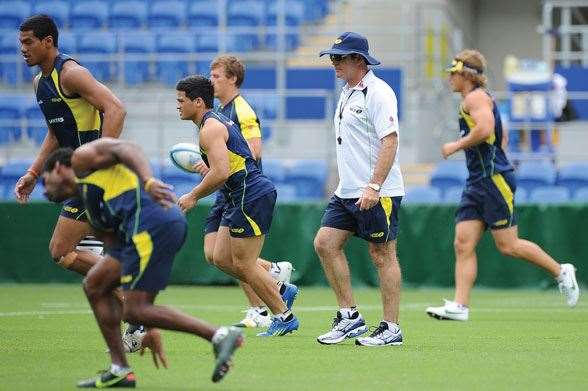 O'Connor puts his charges through their paces on the Gold Coast in 2012. (Photo by Getty Images)
O'Connor puts his charges through their paces on the Gold Coast in 2012. (Photo by Getty Images)We heard that you accompanied the Aussie men’s squad to the Oceania Sevens in Auckland as they sought – successfully in the end – to qualify for Rio 2016. What were your overall thoughts on the boys’ performance that weekend?
Yeah, Tim Walsh, the acting coach, asked me to go over and help a little bit with the analysis; keep an eye on the other sides and have a general look at what the Aussies were doing as well. I thought we were very good. Very clinical. We only had one try scored against us. The boys played extremely well. We came away without any injuries, too. Everybody had good game time; the player rotation was very good. We now have a men’s squad which is very flexible, with greater depth than we’ve ever had, certainly since I’ve been involved. We are in a position where we don’t have to play a player because he’s good at doing one thing. We have some players who are multi-skilled; they can catch, restart, are good in a line-out, good across the paddock. We are in really good shape, actually.
What have you been up to since your Aussie Sevens head coaching days came to an end in 2014?
I have kept an interest in the game, doing a bit of development coaching up here in Queensland. The Aussie Sevens program is centralised down in Sydney now, but a lot of its players come from Queensland. I have been keeping an eye out, going to local sevens tournaments, having a look at where the talent is, watching out for highly skilled younger players. For example, there’s a group of younger players who went over to Samoa for the Youth Commonwealth Games in 2015. I have had those players come into development training sessions which I’ve run. I also went to New Zealand towards the end of the year where they played a series of games against New Zealand at Rotorua. So I’ve kept in close contact with what is going on and I’m just absolutely delighted the guys were able to qualify for the Rio Olympics with that Oceania tournament win – and so convincingly, too.
Apart from the incredible exposure an Olympic Games appearance will provide for Sevens, what are some of the other benefits the sport is about to reap from Rio 2016?
Just on that exposure aspect though; I have seen this happen with the Commonwealth Games ... Sevens has become one of the most popular sports at the Comm Games ticket sales-wise. I think it will be a real hit at Rio as well. You are going to get a lot of people coming to watch the matches; it’s full of high-energy, short, sharp action which is great to watch. The stakes are high. It will be great for the viewers at home and also the crowds.
Are you able to outline the general game plan to winning a game of sevens? What exactly are you focussing on?
It can depend very much on who you are playing. There is a lot of analysis. When I became involved in coaching seven, eight years ago, you did your own analysis. Now, every team has a full-time analyst who travels with the team. You have to look at all the trends in the game. Some teams play a different style to others, so as a coach you have to build your game plan around what you consider are the opposition’s weaknesses. You make those judgements from your own experience, and then you have to play to your own strengths. Not all teams play the same. For example, we don’t play the same way Fiji does. They are a very successful team who have absolutely wonderful athletes who play very high-risk-high-reward; theirs is an offload-dominated game where they don’t like to go into rucks. Our game, in comparison, is more confrontational, physical; we’re strong in contact and we don’t mind setting up multiple phases to score tries if we have to. We are more of a methodical team, very similar to South Africa in that respect. And that’s the great thing – there’s no real right or wrong way to play sevens.
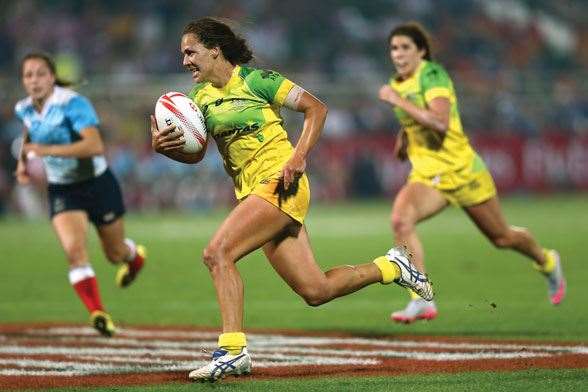 Evania Pelite crosses for the Pearls during the Dubai Sevens late last year ... which they won. (Photo by Getty Images)
Evania Pelite crosses for the Pearls during the Dubai Sevens late last year ... which they won. (Photo by Getty Images)Our women’s squad has also qualified for the Rio Games. Were there times at Narrabeen where you’d be peeking across the paddock to see what they were up to? They must be doing something right as well, hey?
They have been doing things right for a while, even before they got into Narrabeen. The fact they’re all there and they’re full-time, they got a jump on a lot of countries, I think. Their talent recruitment has been exceptional. The way they’ve gone into other sports like touch football and rugby league, basketball – they’ve gone after really good athletes ... and they’ve got them, and got them very committed. They are a really good group of girls who are motivated, really striving for Olympic success. They have some world-class players, too. They really have. They have Emily Cherry, Charlotte Caslick, a number of girls who, if you picked a “world” seven, you’d have three-four candidates. If you have world-class players in your team, that’s a big plus. They are all strong characters, really good girls, really hard working, and well-coached. Tim Walsh and Scott Bowen have done a really good job in understanding them. They are good communicators and they’ve done a really good job with those girls.
You have previously nominated Israel Folau and Michael Hooper as two players who would’ve prepared for the rigours of Olympic Sevens under a minimal turn-around from 15s. What is it exactly about them that sways you in their direction?
For starters, Michael Hooper is just a consummate footballer. In sevens, you have to be good at everything. You can’t have weaknesses; you can’t just be a good attacking player, you have to be able to tackle, understand the ruck, the breakdown. And he does. He really gets it. I saw him play in the 20s a couple of years ago ... I tried to get him into sevens but he swung straight into Super 15s. He understands the nuances; he’s a smart guy. He has a high footy IQ. It wouldn’t take very long at all for him to adapt to the game and I don’t think Izzy would either, just because of his athleticism. He would be used in the air for restarts ... among many other things. As a ball-carrier he’s a wonderful player; he just keeps on beating players, setting up support. He’s big. That’s the other thing. Teams are getting bigger and bigger, and he has good size. The Kiwis these days are averaging 97-98kg a player. They’re big boys; they can man- handle sides. But Hooper and Israel are both big boys as well.
You have been around tournament rugby for a long time and would be the least-surprised bloke in the world that an event like the NRL Nines has really taken off ...
I think if you’d been going up to Hong Kong the last 30 years ... it’s been around for a while. A Sevens tournament is a full-on day of entertainment. Tournaments are great in that they build to a climax. And if everything is done well – you have the right stadium and you have the right atmosphere, music – there’s really no downtime. Alcohol, the corporate boxes. You have one exciting game, the next game you might not be as interested in, but there are always a number of exciting match-ups on day one. You always have a few upsets, and day two culminates on the Sunday afternoon. It's great. Particularly in places like Hong Kong, Dubai. Wellington ... They are great stadiums; they sell them out. There is definitely a formula to keeping the crowd interested and excited and entertained. Whether it’s fancy dress or whatever. The sevens people just have good experience at doing it. It's a great once-a-year thing. A lot of people save up. Not that it’s expensive. I think the Sydney Sevens are going to be an absolute success, because it’s a cosmopolitan city with a really good knowledge of rugby and also you have the corporates and people who like to come along and really let their hair down, get dressed up, let off a bit of steam after a busy week.
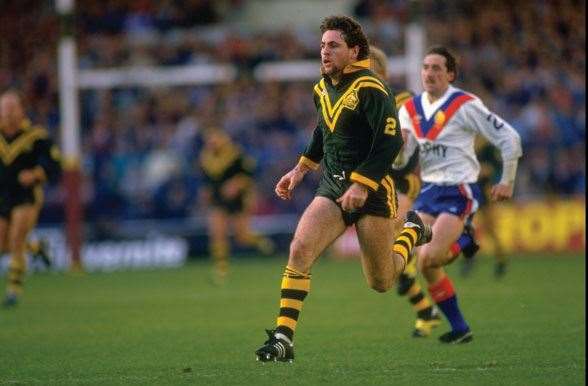 1986: Australia vs Great Britain, Leeds. (Photo by Getty Images)
1986: Australia vs Great Britain, Leeds. (Photo by Getty Images)Do you have much contact with your old rugby league mates? Do you ever see the day where you’re back working in the 13-man game?
No, I don’t. I have been out of league for too long now. I still watch it and enjoy it, but those sorts of things ... you have to spend your time around the game – like Des Hasler did, and Geoff Toovey – as an assistant coach, learning from other coaches. The game is changing, too; you have to keep up with the trends, you have to be relevant. There are new coaches coming through who are fresher about the game. So, no, I wouldn’t. I am 55 now; I don’t have any great ambitions to move back to Sydney. I am relatively happy with what I’ve been able to achieve as a player. There is a connection there with the sevens; I do love the sevens. Besides, to take on a 55-year-old who hasn’t coached in the NRL would be a massive risk. Maybe not ... In saying all that, I do think the game has become very generic in general play, a lot of sides looking at each other and playing the same way. It can be good to have new coaches come in with fresh ideas, but you don’t have long to perform. It can be pretty ruthless.
You played both codes of rugby: we’re you surprised at England’s seemingly harsh treatment of Sam Burgess, and also his decision to return to league as soon as he did?
Yeah, I think he was a scapegoat, really. They picked a very inexper-ienced squad. I didn’t think England had the time together to build on things which are important in a World Cup, like centre combinations. If they were to keep that side together ... I don’t think it’s necessarily bad coaching or anything like that. It might’ve been down to poor planning. Picking Sam Burgess in the squad after such a short time in the game was always going to be risky. I had this conversation with a journalist when he signed and I remember saying the biggest risk I could see would be that Sam would come on in a really tight game and hit somebody high. And that’s the thing; it takes a while to adapt. Rugby union is a lot harsher on high tackles than rugby league. What you might get away with in rugby league ... it’s a yellow card in rugby union. That to me was the biggest risk in taking a league player into a World Cup, which is full of tight situations. Oh look, you know, he gave it a crack. I don’t blame him. He is back with his brothers in rugby league. Tell you what, he’s a good rugby league player and he’ll certainly make a difference at Souths.
Related Articles
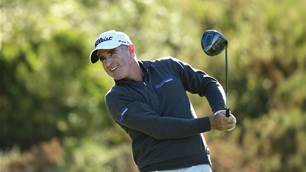
Video interview: Drinks With ... Matt Millar

'Worlds best rugby sevens' could play NRLW
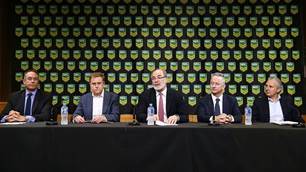
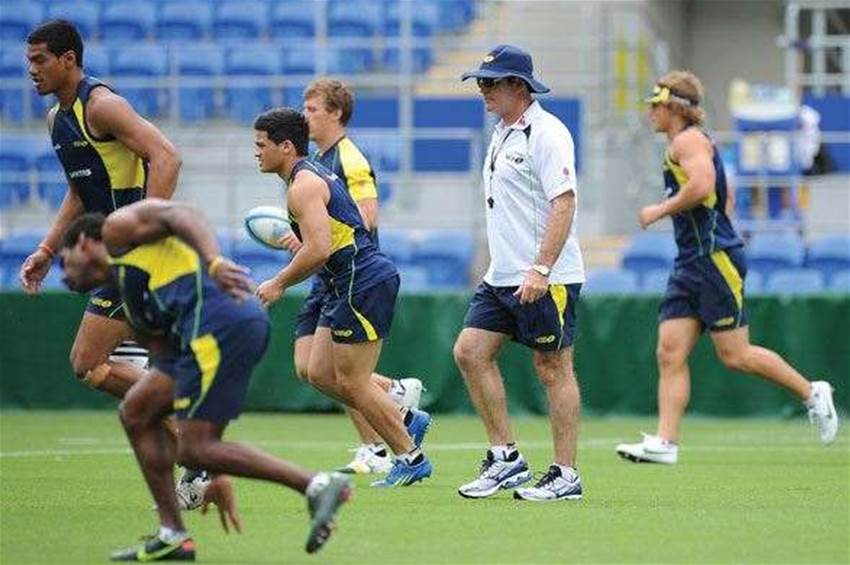
.png&h=115&w=225&c=1&s=1)










